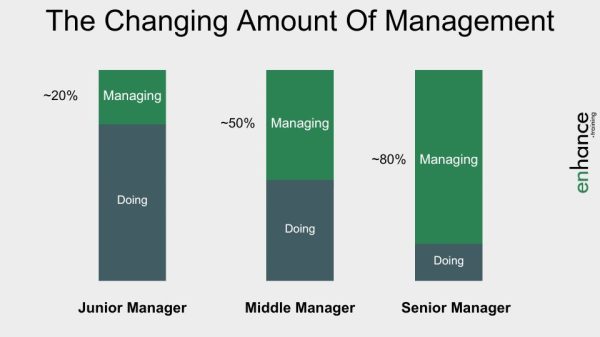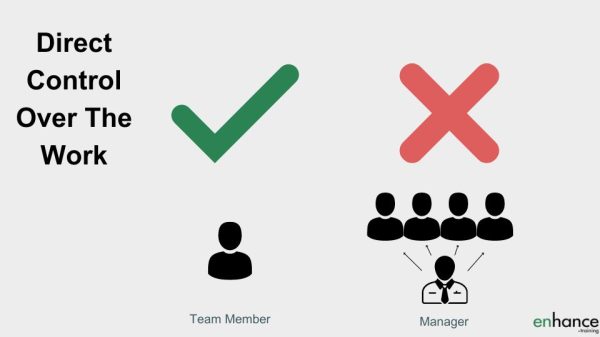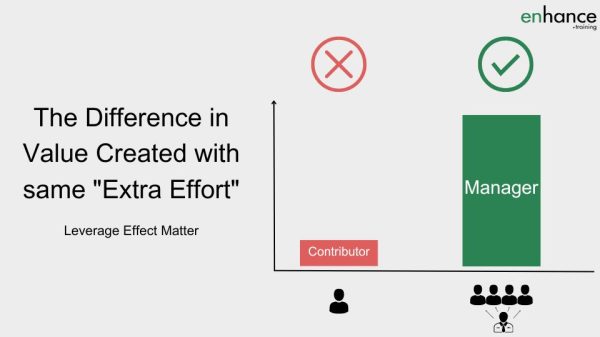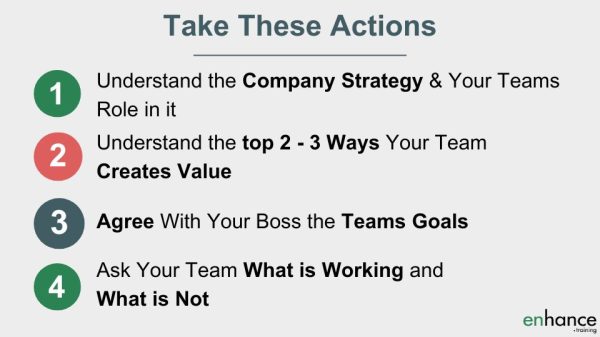Start Brilliantly. 6 Crucial Actions To Go From Employee To Manager

Transitioning into management; to go from employee to manager is a tough step for anyone. You are leaving the known, what you are good at and stepping into a completely new job and career.
Many of us transition from an employee to a manager through internal promotion. This means a peer to manager transition which creates even more challenges. How do you reset relationships and change perceptions as part of starting your new manager role?
To make the transition to management easier, learn 6 crucial actions to go from employee to manager. I explain why each action is so important and how to do a great job in each area.
6 Crucial Actions to go from Employee to Manager
- Understand the picture and create a vision
- Stop doing and start delegating
- Focus on Flexibility
- Create one-on-one time
- Ask lots of questions and make small changes
- Create your learning network
Watch on YouTube
Listen on Podcast
The first action as you go from employee to manager is to
understand the bigger picture and create an authentic vision for your team
Starting as a new manager is daunting. It is also daunting for your team to have a new manager managing them. There are several actions I suggest you take to make transitioning into a management role easier for you and your team.
- Understand the company strategy or at a minimum your team’s part in delivering the strategy. Ask your manager to take you through this or discuss it with them.
- Understand the top 2-3 ways your team creates value for the company and focus as much time on these activities as possible. Again discuss with your boss.
- Agree with your manager the team goals and understand the specifics of what they expect from you. i.e. be really clear about the expectations you need to meet and beat.
- Ask to your team what is working and what is not and listen to what they tell you
These actions might seem daunting, yet you have an amazing window to ask as many sensible questions as you can without any negative comeback. Maximise your use of this window.
Understand the bigger picture and how your team will help achieve the function and team goals. Alongside this, think about how you are going to explain the purpose of the team or how you as a team are going to achieve these goals. Create a vision in your own words to describe this. Keep it simple and authentic. Some examples might include:
- Providing the quickest and most useful customer service to maximise additional sales through the team
- We are going to focus on invoicing, invoice queries and credit control to collect more cash than profit generated.
- Identifying winning conversation tactics and cross training each team member to increase lead conversations by at least 40%.
Having a clear vision helps set and keep expectations and team direction.

stop doing and start delegating – the second action to go from employee to manager
As you transition from co-worker to manager, you will still be doing a lot of your old work. Typically, new managers or junior managers spend some 80% of their time doing and 20% managing.
That 20% managing is very important. Focus on what you need to do as a manager, the most important being:
- Setting clear and consistent direction and expectations
- Creating an enjoyable, trusting and supportive work environment
- Support the team members to do their best work
You can create more value for the business in the 20% of your time focused on managing than the 80% you spend doing – because you are leveraging the efforts of your team members.
Trust your team members to do their job and work closely with each of them so you get to know them, their strengths and weaknesses, their character, how they respond in different situations etc.
Don’t try to do a better job by working harder and creating more output personally. Learn how to delegate work and leverage the efforts of your team members to create lots more value than you could on your own. This is managing others well.

The third action as you go from employee to manager is to focus on Flexibility
There is a big danger as you start your new management role that you feel the need to impress everyone and justify your promotion. This self-inflicted pressure can drive damaging behaviour and alienate your team. A couple of examples include:
- Not listening to you team for their problems, ideas and solutions
- Pressurising yourself to come up with the ideas and solutions for all the problems the team faces.
- Inappropriately trying to assert your authority on the team by giving orders and telling rather than persuading
You have been promoted for many reasons and you have 3-6 months to impress. You will not be expected to do an amazing job from day 1. Keep any performance insecurity to yourself. Focus and work on how you can help each team member do a great job.
Maintaining team performance in the first few months as a new manager is a big win!
Approach everything with flexibility. For example:
- There are many ways to solve most problems. Ask you team for ideas, be collaborative and use the best one, rather than your one.
- Get to know your team in detail and think about how you can flex your management approach and communication style to best fit in with their needs.
- Ask the stronger team members to solve problems as well as do tasks. Ask them to make decisions within specific parameters.
- Practice give and take. Work out how you are going to give your team members a good deal in return for good performance and positive behaviours. Providing development and opportunity are both must do items for your list.
Being flexible and responsive to the different team members and situations you face, will make your job easier, you will do a better job and the team will appreciate you a lot more.

Book in lots of One-to-one time – The fourth action transition from an employee to a manager
If you are new to the team, you have relationships to develop. If you are transitioning from peer to manager, you have to reset all the relationships you already have. Both require time and effort.
Learning about your team members is pretty critical to being able to get the best out of them. I try to work out the following about my team members
- The extent and level of their skills
- Their judgement and decision making
- Their character & values
- What energy levels they have
- Their ambitions and dreams
- How they react in different situations
- Their desire and ability to learn
Use your one-on-one meetings to mentor and coach your team members. There will be plenty of things you can help them improve. Don’t forget to learn from them too.
Use your one-on-one meetings for:
- Two-way sharing of information about what is happening
- Building and strengthening relationships on a personal and professional level
- To set and reinforce goals and expectations
- Jointly solve current problems faced by you or them
- To make decisions
- Provide coaching and mentoring to help your team members improve
One-on-one time each week with team members is a vital management tool in my opinion. Make the best use of this time you can.
Ask lots of questions and make small changes
As mentioned earlier, maintaining team performance and morale in the early months as a new manager is a big win. Make a big part of your role as manager focused on how you help each of your team members do a better job. Do this and maintaining and possibly improving performance will be much more straightforward.
It is very hard to help team members if you don’t understand what they are working on and what problems they are facing. The best way to find out both is to ask a lot of questions, listen carefully to what they tell you and act where it is sensible to do so.
Always ask questions to learn and with the aim of helping. If you keep this firmly in mind, your positive supportive approach will come out in your questions and actions. This in turn will get the team members to open up more, and give you more opportunity to help.
Aim to get at least one win, big or small, each month for each team member. If you are working hard on helping, you will be getting a lot more wins than this.
Don’t aim to make big changes. Focus on small changes first, and as you gain knowledge and confidence, work on the bigger changes. This approach will create a lot of confidence with your team members and your boss!

Create your learning network – The sixth action as you go from employee to manager
Transitioning into a management role is in effect the start of a new career. You have a huge amount to learn and lot of skills to practice.
What has made you successful to date is not necessarily going to help you be good at managing others. For instance being firmly in control of all the stages of getting a piece of work done may now translate in micromanaging and disengagement of team members. Make time to reflect on your assumptions and biases.
Try to learn from any and every source you can. Your manager is a very important person for your first six months as a new manager. Ask lots of questions. Run your ideas and solutions past them to get their buy-in plus input to improve what you are doing.
What can you learn from your boss’s peers? Are there any other managers you get on particularly well with that you can ask for mentoring from?
What sources do you have in your network for mentoring, coaching and peer support? Explore what courses will help you deepen your management skills much quicker than via trial and error? What books will help you improve your skills and management approach.
Actively seek out sources to learn as much as possible as quickly as possible. Knowing what to do reduces your stress and makes you a lot more effective, more quickly as a manager. Yes, you still have to practice to build the skills, but at least you know you are practicing the right things.
Proactively create your learning network!
in summary
The transition from an employee to a manager is incredibly exciting and daunting in equal measures. To go from employee to manager is in effect starting a new career, with more potential on offer and more demands placed on you.
Use the 6 crucial actions to go from employee to manager as quickly and as painlessly as possible. To recap, these are:
- Understand the picture and create a vision
- Stop doing and start delegating
- Focus on Flexibility
- Create one-on-one time
- Ask lots of questions and make small changes
- Create your learning network
If you have any questions on “Start Brilliantly. 6 Crucial Actions to go from Employee to Manager”, please email me at support@enhance.training and I will get back to you.
Many of the skills and approaches that made you great at your job as a contributor can become a big hindrance when you become a manager. Making the transition from employee to manager using trial and error alone is really tough.
Learn as much as you can as quickly as you can from books, videos, courses and the managers around you. Managing others is a skill that needs a lot of practice. To get good, you need to be practicing the right things!





